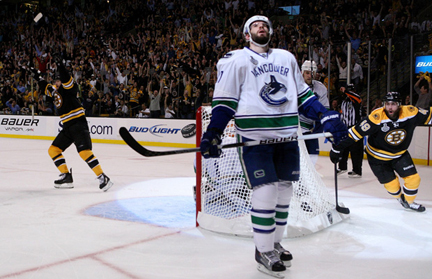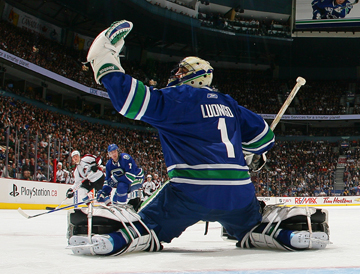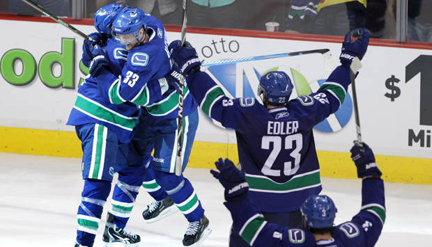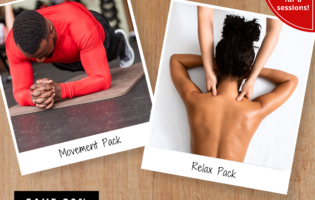Total Therapy Blog
Surviving the Series – Bouncing Back

Editor’s Note: This is a guest post by Amrit Crowther, MA, RCC, our in-house Clinical Counsellor. Check out her website at http://coastmtcounselling.com/
Anybody watching the last two Vancouver vs. Boston games probably noticed that sinking feeling in their stomach, or their heart clench in their chest as they watched Luongo let another puck into the net and the rest of the team fail to land any of their shots on goal. Can you imagine what the Canucks were feeling as the first goal lands in the net, trying to gather their thoughts, and not lose hope? How about after the third goal? Many of us have seen the interviews after the game when players are interviewed and they say something like, “we tried our best tonight and it didn’t come together, we have to let this one go and focus on bringing the team together to win the next one”.
That sounds great but what do you with the lingering thoughts, (“I really messed that one up, what if I do it again?”) feelings (sadness, guilt, anger, fear) and images/memories (seeing the puck fly past into the net, feel yourself fumble and lose control). What do you do about the sensations you experience as you revisit your failure (gut clenched, chest seized, cannot take a deep breath).
Everything we experience is filtered through our senses, our emotions, and thoughts. Most events in our life don’t meet the necessary requirements to be kept in recallable storage (like eating breakfast, going to work, taking out the garbage etc). But…if something feels really good or really bad, the brain wants keep to track of it to either seek out or avoid the same thing in the future.

Here’s the catch. Just like having a bad night at the rink, sometimes we have to continue doing things that we had a terrible experience with in the past. How can we convince our brain to keep doing what feels bad (e.g. playing a game/sport we lost at last time, going to a job interview, working through a rough patch in a relationship, dealing with loss etc)?
The key is to know how the brain works and use it to your advantage. If you are in the middle of the game and things are not going well, you may notice some negative thoughts, feelings, memories and body sensations occur. You may find your mind on overdrive, reviewing the mistakes you made, obsessing over who is watching, worrying over how nervous you feel, how you don’t want to mess up. For most of us, our first instinct is to tell ourselves to “snap out of it”, stop thinking about it. The problem is that this doesn’t work because our brain is designed to remind us continuously about bad experiences so we don’t do the same thing again.
 So what can you do to break the cycle? Take a step back from your thoughts or the “story in your head” and label them ‘thoughts’ or ‘protective thoughts’. Don’t try to fight them – it will waste energy and may cause frustration or a sense of failure. Once you have labeled the thoughts, bring your focus to your physical body and what it is currently doing/experiencing (e.g. focus on your breathing to calm it down; what your feet on the ground feels like; the glide of your skates on the ice, etc). When its “go” time, don’t think about what your body is suppose to be doing – your muscle memory is much better at this and thinking often interferes with your body’s natural recall.
So what can you do to break the cycle? Take a step back from your thoughts or the “story in your head” and label them ‘thoughts’ or ‘protective thoughts’. Don’t try to fight them – it will waste energy and may cause frustration or a sense of failure. Once you have labeled the thoughts, bring your focus to your physical body and what it is currently doing/experiencing (e.g. focus on your breathing to calm it down; what your feet on the ground feels like; the glide of your skates on the ice, etc). When its “go” time, don’t think about what your body is suppose to be doing – your muscle memory is much better at this and thinking often interferes with your body’s natural recall.
Calming down in this fashion shifts your focus to the Now. Like any new skill, you’ll have to practice this until it becomes automatic. If you have a break away from the game, try accessing a memory from a time when you were playing really well, on top of your game. Think about what you could see and hear (the crowd cheering), what it felt like (shoulders back, smile on your face), what thoughts you had at the time (“I am so awesome, I totally nailed it”) and the feelings you felt (happiness, proud). Have this memory ready when you need it – the more you practice it, the easier it will be to access. If you’re having trouble doing the above mentioned technique, it could be that you have some other things going on in your life that are distracting you from the game, or it might be that the negative thoughts and feelings are so overwhelming, your brain needs a little extra help to relieve their impact.
The brain is very similar to other parts of the body – if it has experienced pain in the form of emotional pain, it needs help and time to recover. With the right tools, and the right people, you can bounce back from a negative experience or life event – whether its dealing with a job interview that went sideways, or dropping a couple play-off hockey games.

In the case of our Canuck team, don’t worry about them. They have a team of experienced therapists helping them physically and mentally. We will bounce back!
 Amrit Crowther is a Registered Clinical Counselor (R.C.C.) with the BC Association of Clinical Counsellors. Her training includes a B.A. in Psychology from the University of British Columbia and an M.A. in Counselling Psychology from the Adlerian School of Professional Psychology, Vancouver.
Amrit Crowther is a Registered Clinical Counselor (R.C.C.) with the BC Association of Clinical Counsellors. Her training includes a B.A. in Psychology from the University of British Columbia and an M.A. in Counselling Psychology from the Adlerian School of Professional Psychology, Vancouver.
She is happily married and have two children. She stays healthy with bike riding, yoga and going to the gym.
If you have any questions about this article, or anything else, please feel free to contact us. Go Canucks!








Follow Us!
& Stay Up To Date
BLOG